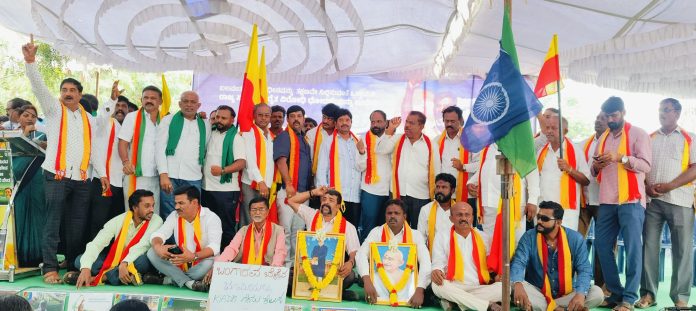– Mohammed Talha Siddi Bapa
A green belt is under siege. At dawn, Channarayapattana’s fields ripple with life – ragi blades trembling in the breeze, mango orchards buzzing with bees, and ancient irrigation channels winding through the terrain. Yet over this fertile expanse looms a bleak transformation: a Defence and Aerospace Park set to replace trees, crops, and communal memory with hangars, asphalt, and sterile industrial machines.
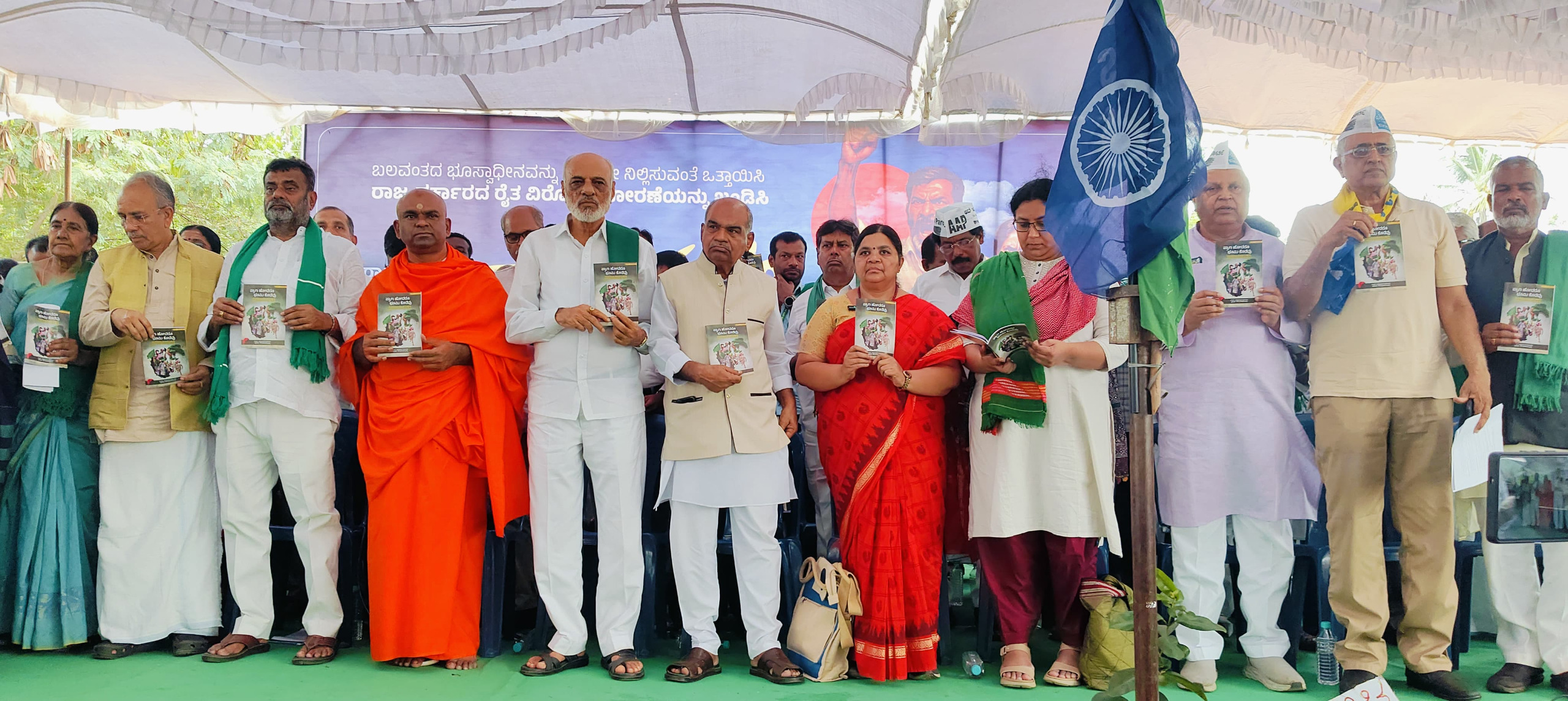 This is more than a land dispute – it’s a clash between corporate appetite and agrarian justice, between the sacred soil that sustains 800 families and the profit‑driven bulldozers threatening to erase their heritage (thenewsminute.com, deccanherald.com).
This is more than a land dispute – it’s a clash between corporate appetite and agrarian justice, between the sacred soil that sustains 800 families and the profit‑driven bulldozers threatening to erase their heritage (thenewsminute.com, deccanherald.com).
Broken Promises and Bulldozed Trust
In August 2021, under BJP rule, the Karnataka government issued the first notification to acquire 1,777 acres of fertile farmland from Dalit and OBC communities near Bengaluru’s airport (deccanherald.com). Many of these lands trace back to Devaraj Urs land reforms, yet farmers quickly united, setting up protest camps, launching tractor rallies, and staging sit-ins in Bengaluru.
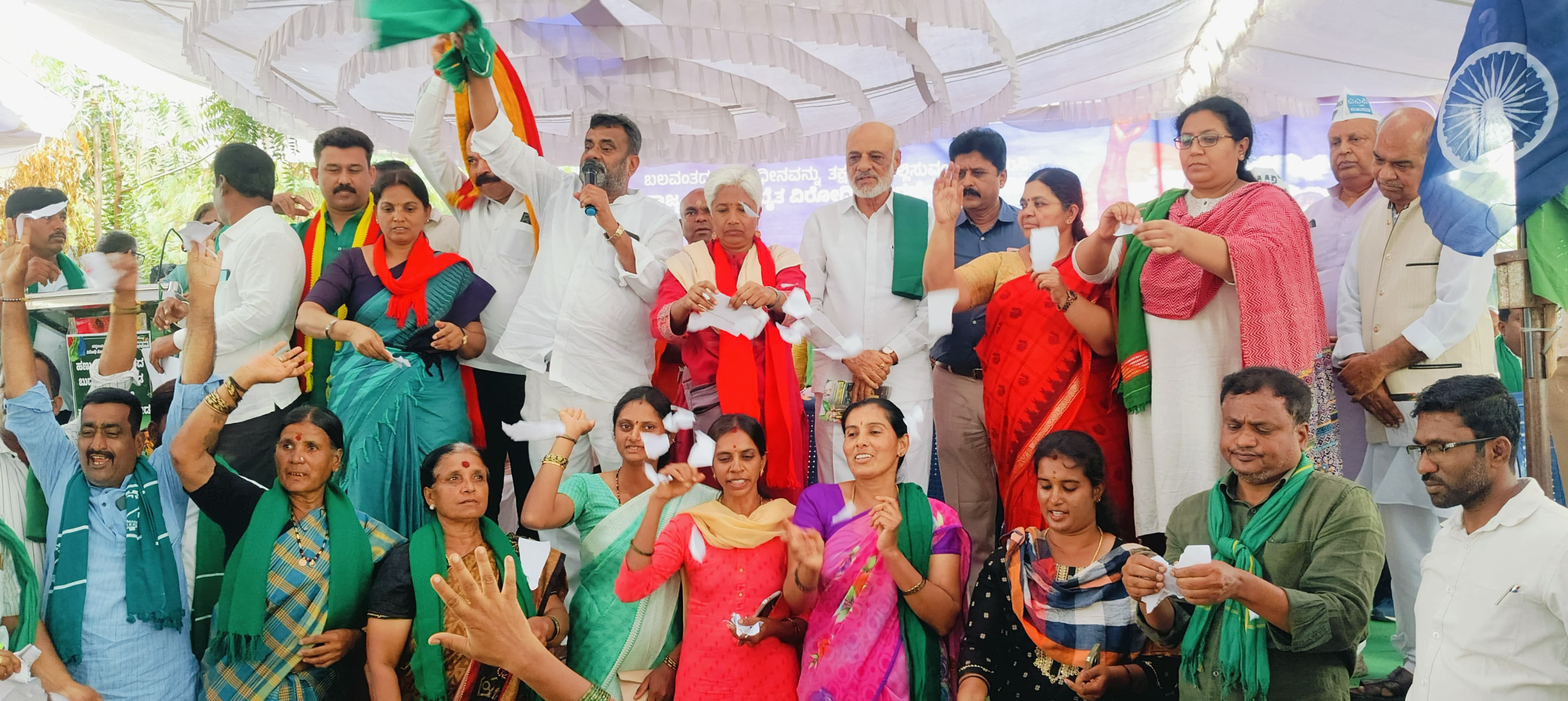 In September 2022, then-opposition leader Siddaramaiah visited these protest sites and assured villagers he would cancel the acquisition if Congress came to power. But after taking office in 2023, the government pressured ahead – KIADB issued final notices in early 2025. Industries Minister M.B. Patil and MLA K.H. Muniyappa defended the move despite strong backlash, prompting one farmer, Rangappa, to lament, “They used our votes to seize our soil.”
In September 2022, then-opposition leader Siddaramaiah visited these protest sites and assured villagers he would cancel the acquisition if Congress came to power. But after taking office in 2023, the government pressured ahead – KIADB issued final notices in early 2025. Industries Minister M.B. Patil and MLA K.H. Muniyappa defended the move despite strong backlash, prompting one farmer, Rangappa, to lament, “They used our votes to seize our soil.”
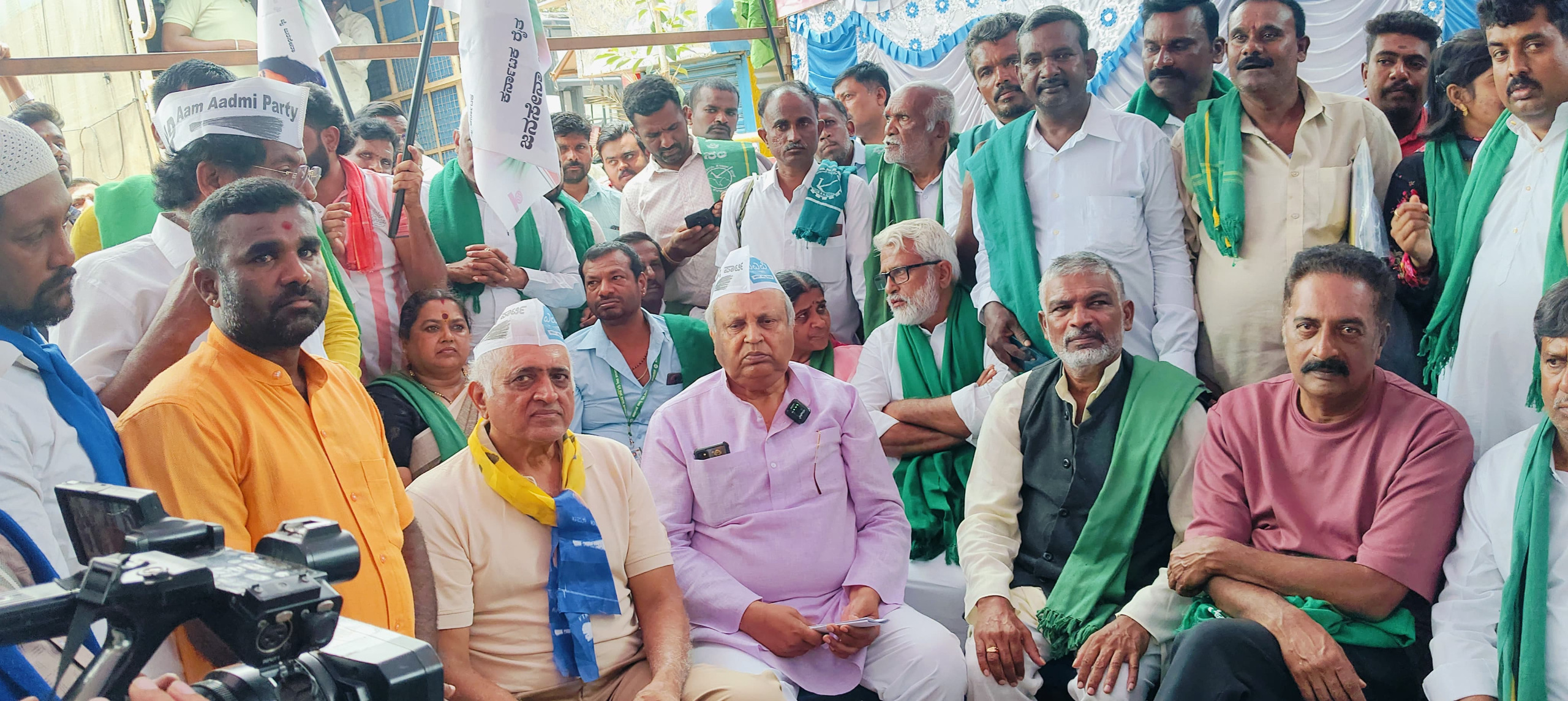 This daring mission violates the Land Acquisition and Rehabilitation Act, 2013: no consent, no social impact assessment, no rehabilitation plan. During May 2022 public opinion gathering, more than 80% of villagers rejected the acquisition – but the government ignored this mandate and handed out 30-day evacuation notices anyway (deccanherald.com).
This daring mission violates the Land Acquisition and Rehabilitation Act, 2013: no consent, no social impact assessment, no rehabilitation plan. During May 2022 public opinion gathering, more than 80% of villagers rejected the acquisition – but the government ignored this mandate and handed out 30-day evacuation notices anyway (deccanherald.com).
Cement and Concrete Over Crops
Supporters claim industrial progress and job creation await – but local farmers beg to differ. “What’s the use of drone factories when we cannot grow food?” asked Shantamma, a millet farmer. “Can cement feed our children?”
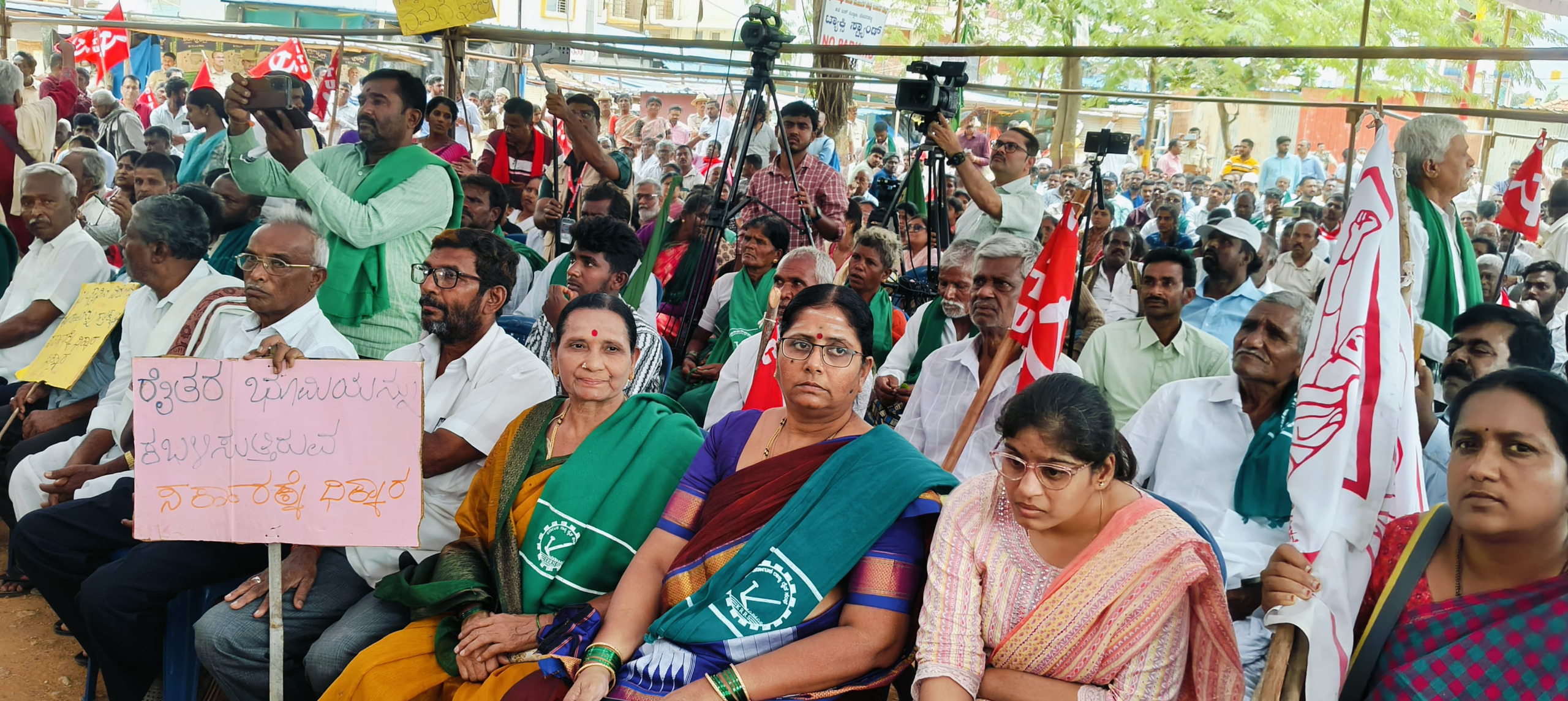 Previous projects in Ballari and Nanjangud yielded scattered industrial sheds, while displaced farmers ended up surviving on meagre relief payments or casual labour – a steep decline from their independent agrarian incomes.
Previous projects in Ballari and Nanjangud yielded scattered industrial sheds, while displaced farmers ended up surviving on meagre relief payments or casual labour – a steep decline from their independent agrarian incomes.
“These lands aren’t just our income – they’re our inheritance,” said Siddesh, pointing to a neem tree planted by his grandfather. “You cannot build futures by erasing roots.”
Statewide Resistance & Civil Solidarity
On June 25, 2025, peaceful resistance erupted. Across Karnataka – from Dharwad to Mysuru – farmers were joined by Dalit activists, women’s collectives, students, artists, writers, and actor Prakash Raj (thenewsminute.com). Tents were pitched at the tahsildar’s office, and a powerful 24-hour ultimatum was delivered to Chief Minister Siddaramaiah:
“Either leave us alone to live our lives – or imprison us with our families.”
Taluk-level sit-ins and gheraos, including a protest at the CM’s residence, escalated as police detained several demonstrators, including public figures – an act widely criticised as heavy-handed (thenewsminute.com, hindustantimes.com).
National Solidarity: A Wider Indian Resistance
The Devanahalli struggle has gained widespread attention beyond Karnataka. Farmers’ unions from Tamil Nadu, Maharashtra, Gujarat, Andhra Pradesh, and rural rights groups in Delhi and Punjab have voiced public support. Federations like the All India Kisan Sangharsh Coordination Committee (AIKSCC) and Mazdoor Kisan Shakti Sangathan (MKSS) have demanded the state withdraw the acquisition (deccanherald.com).
“No land is safe if we stay silent,” said Jitender Singh, a Haryana farmer leader.
Interstate volunteers have reached Devanahalli, offering aid, medical care, and amplifying the cause nationally – turning this into a pan-Indian battle for agrarian rights reminiscent of the 2020-21 farm law resistance.
The Partial Retreat – But the Core Remains
Under intense pressure, the government announced a partial rollback on June 24-25, deciding to exclude 495 acres – in Channarayapattna, Mattibarlu, and Shrotriya Tellohalli – from acquisition (deccanherald.com). However, a staggering 1,232 acres across ten other villages remain under threat.
Despite offers of 10,771 sq ft of commercial land per surrendered acre, villagers remain unconvinced. 67-year-old Lachamma asked poignantly: “What will we do with plots when we lose our farms?”
Lessons from History: Nandigram and Beyond
This fight echoes Nandigram (West Bengal, 2007), where villagers halted a forced petrochemical project. In Kolar, factories replaced farmland but failed to sustain the displaced. These histories reveal a pattern: when corporate dreams outrun local realities, only ruin follows.
Devanahalli may become Karnataka’s defining uprising – a red line drawn in agricultural soil.
Ecological & Cultural Stakes
Beyond land and law, the ecological consequences are stark:
- Loss of wetlands that sustain groundwater recharge
- Topsoil degradation crippling future farming
- Rising urban heat islands exacerbating water stress for Bengaluru (com, hindustantimes.com).
“Our trees are our ancestors, our soil is our scripture,” said Revanna, gesturing to a mango grove. “We don’t just grow food – we grow memories. Can any SEZ compensate for that?”
These lands contain graveyards, village wells, seasonal rituals, and multi-generational gatherings – eras etched in the land itself.
National Movement Backing: SKM & Kisan Sangharsh Samiti
The Samyukt Kisan Morcha (SKM), a national farmers’ coalition that led the 2020–21 protests, issued a strong press release from New Delhi on 27 June 2025, condemning excessive police force and declaring solidarity with Devanahalli farmers, calling the government’s actions “illegal” (countercurrents.org).
Simultaneously, the Kisan Sangharsh Samiti demanded the dismissal of DSP Sachin Kumar and urged Congress leaders, including Rahul Gandhi, to intervene. Declaring the acquisition both illegal and unconstitutional, the Samiti said that suppressing farmers would be “politically suicidal” for Congress.
These developments have turned Devanahalli into a national test case for agrarian resistance and federal government accountability.
The Road Ahead
As Karnataka edges closer to a confrontation with its own farmers, it faces a critical choice: corporate cannibalism or agrarian dignity. With national backing, legal violations exposed, ecological collapse looming, and generational communities at stake, can the state truly claim to champion “progress”?
Because here, in Devanahalli’s fields, Karnataka’s future is being sown – and this time, the people aren’t just watching. They’re writing the narrative – on land they refuse to surrender.


